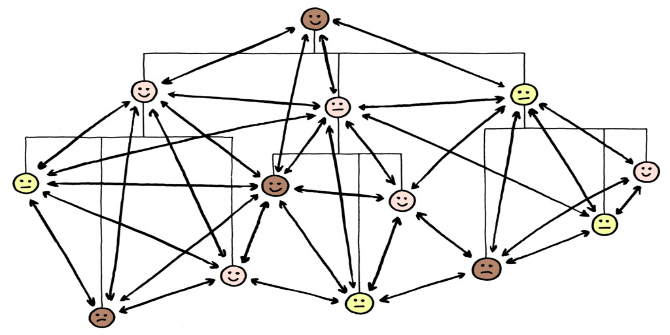 All researchers are now encouraged to disseminate their work beyond academia, particularly if they aim to foster engagement and have an impact. However, the immediate benefits of research dissemination are not always clear and, for early-career researchers in particular, the prospect of attracting criticism or even hostility can feel daunting. But to Marte C.W. Solheim, there is great value in the practice and experience of research dissemination, as it can help you to express yourself clearly, formulate solid arguments, think critically, take a position, and, above all, develop the courage to use your voice.
All researchers are now encouraged to disseminate their work beyond academia, particularly if they aim to foster engagement and have an impact. However, the immediate benefits of research dissemination are not always clear and, for early-career researchers in particular, the prospect of attracting criticism or even hostility can feel daunting. But to Marte C.W. Solheim, there is great value in the practice and experience of research dissemination, as it can help you to express yourself clearly, formulate solid arguments, think critically, take a position, and, above all, develop the courage to use your voice.
A few years ago, while a PhD Candidate, I was invited to speak at a large national conference in Oslo, Norway. On the same day, I published, together with my supervisor, an op-ed in one of the largest national newspapers. The day before the conference, I went to the venue for a sound check, excited and nervous at the same time, thinking about delivering my speech to an audience of 1,000 people as well as live-streaming to the entire Norwegian population. It was huge. Family members had flown in to be in the audience, and other family, friends, and colleagues followed the live stream. I talked about my research on the link between highly skilled foreign-born labour and international contacts and how this affects innovation and export. Briefly, the idea is that foreign-born labourers do not break completely with their home country but maintain contact with people in their homelands, which can lead to increased trust in these ties. In addition, foreign-born labourers have knowledge of linguistic and cultural practices, which is beneficial to facilitating international collaboration and exports.
A thank you and a threat
After my speech, a man approached me to say he’d like to thank me, that I had given him a voice. The man was born abroad, had a higher education, and told me about his life, and the ups and downs of his career in particular. I was happy that he had approached me, but also considered that if there is someone who feels like thanking me, there’d almost certainly be someone who felt more opposed to what I had said. Not long after, I was proved to be correct, as I received an email, also copied to the administration at my university. The email informed me that my supervisor and I had been added to a list of people who promoted Islam and immigration and that, when the revolution came, we would be brought to justice for being traitors to the country. Based on the same text and the same speech, we were, on the one hand, an important voice, and on the other, traitorous.
Flattering uncertainty
My first thought on receiving this email was confusion: I did not understand what it was. A link included in the message took me to an overview of about 200 people who had been put on this list, mostly leaders in the Norwegian society, who, in one way or another, had welcomed a multicultural Norway. I had mixed feelings; on the one hand I felt flattered someone had taken note of our research, but on the other I interpreted the email as an attempt to silence us. Fortunately I was able to discuss this with my supervisor, who also actively disseminated his own research and offered me the support and motivation needed to continue my work.
I had previously experienced situations like this, such as negative commentary below op-eds and interviews, as well as on social media platforms. Occasionally these people would contact me directly. I once shared an op-ed I’d written about immigration and innovation. One particularly heated and verbose person argued in all-caps and exclamation points about how wrong I was. Responding, I supported several of the arguments made in the op-ed with references to other research. After going back and forth a few times, we sort of came to an agreement. Perhaps this is because we “met” and engaged in a dialogue. It was possible to be rude to a remote stranger, but after “meeting” and discussing this online, much of the heat was taken out of the debate.
Having researched and written op-eds about politically charged topics, it is no wonder I have attracted criticism, this was anticipated. I’d like to stress, however, that going through episodes like this early in my career has been a positive experience. It has taught me to formulate solid arguments, and maybe made my skin a little thicker too.
Research dissemination is a waste of time!
Because my research has featured extensively in the public debate, earlier this year I was invited to give a speech to about 100 PhD supervisors on the importance of research dissemination and building the courage to have a voice. One participant said: “PhD students should not disseminate research. They should do that later.” But what if “later” never comes? A PhD is often compared to a marathon, and disseminating research can offer experience of mastering and achieving milestones, sustain motivation, and prompt new research directions. The content of a doctoral degree programme today essentially consists of writing a dissertation, completing compulsory courses, and, in the case of some institutions, making a popular science contribution and participating in an international conference. In other words, the assessment is weighted towards writing for scholars, and not dissemination to a broader audience. The “system” also favours and awards scholarly publications to a much larger extent than it does for broader dissemination. The legitimacy of research is in the fact that we disseminate the knowledge the state has invested in, and by expanding research dissemination, that research has more potential to be useful. Nevertheless, when the system is set up as it is, dissemination is not easily prioritised.
New outlook on the PhD programme
Traditionally, the dissertation is thought of as the final product of the doctorate. However, as Professor Karin Maes writes: “It is the person who will be the end product, with all that he or she can be used for. It requires the supervisors start using their students in a different way than they do today.” By redirecting their focus on dissemination, candidates will use the knowledge they have in other ways — something which can provide a broader foundation from which to progress their careers, rather than retaining a single focus on publishing. A PhD should emphasise several ways to learn in order to provide a robust skillset for a career in or beyond academia.
It needn’t take a long time to write a blog post from one’s research paper (and there are several good tips here). Moreover, could one move away from writing the usual paper as part of the PhD course assignment, and write an op-ed or blog post instead? This would require one to be clear, think critically, and take a position. This can be valuable in learning to find one’s “voice” and could also reveal the relevance of one’s work beyond academia. It’s vital that we build the courage to dare to use our voices so that those outside academia can discover, understand, and benefit from our research.
To do so, we must first build a culture that emphasises and truly values research dissemination. You won’t develop the courage to use your voice overnight, but it can be strengthened during a graduate education and in dialogue with more experienced researchers and policymakers. But only when the culture makes room for it.
Note: This article gives the views of the author, and not the position of the LSE Impact Blog, nor of the London School of Economics. Please review our comments policy if you have any concerns on posting a comment below. The author has expressed these abovementioned views in Norwegian through the Norwegian Association of Researchers, and views remain those of the author and not of the University of Stavanger.
Featured image credit: mohamed_hassan, via Pixabay (licensed under a CC0 1.0 license).
About the author
Marte C.W. Solheim is a postdoctoral researcher at the Centre for Innovation Research and University of Stavanger Business School, Norway, studying the nexus between various types of diversity and innovation, and has particularly focused on the role of foreign-born workers and innovation, studied through the lenses of organisational theory, economic geography, and innovation studies. Solheim is actively engaged in the public debate on migration and innovation-related issues in Norway and is invited to speak at national diversity conferences as well as to national policymakers, political spheres, and other institutions. She tweets @MarteCWSolheim








Dissemination of the outcome of a research requires an appropriate audience. Although there would be opposition as well, others will understand and appreciate at the same time.